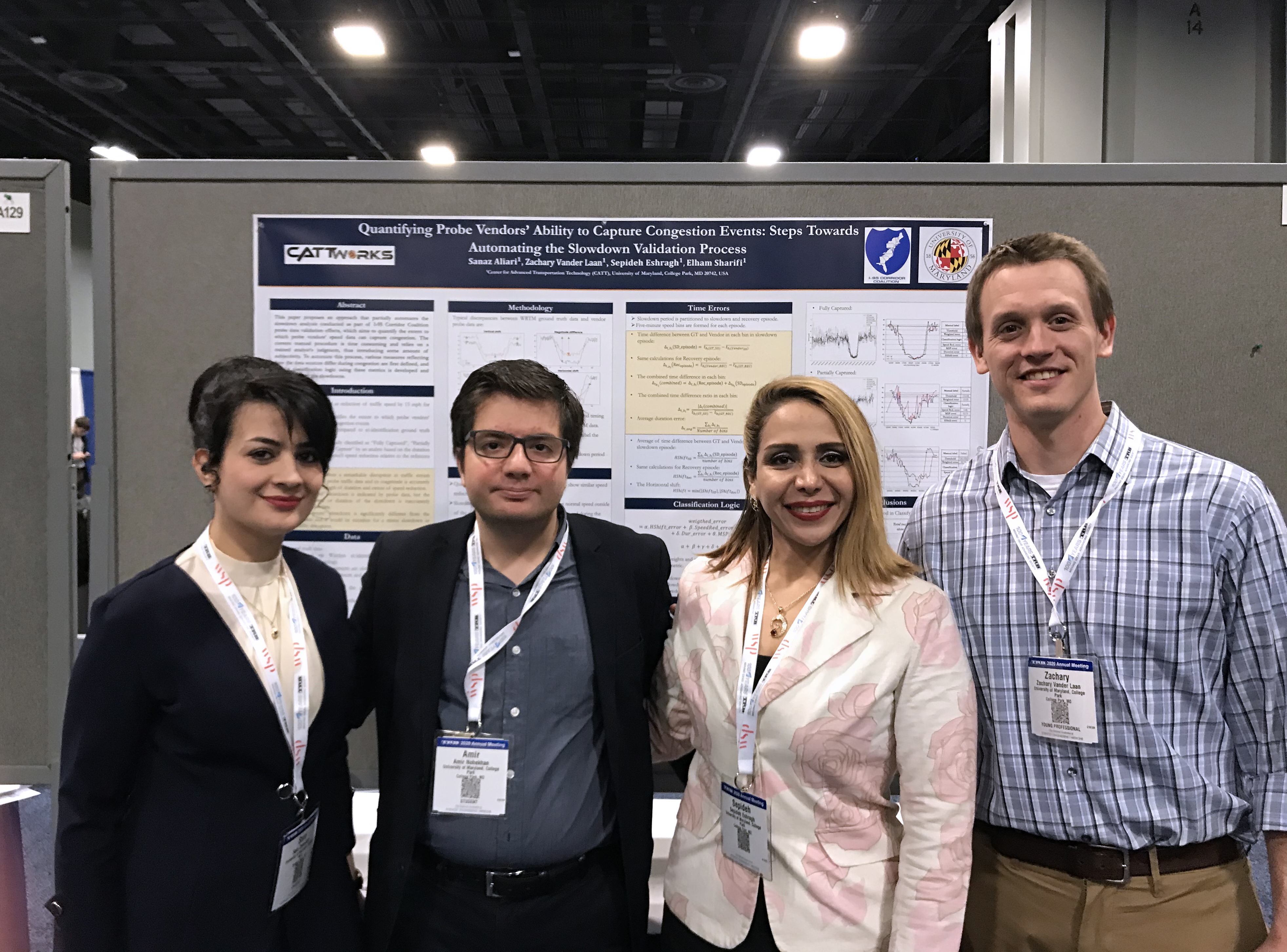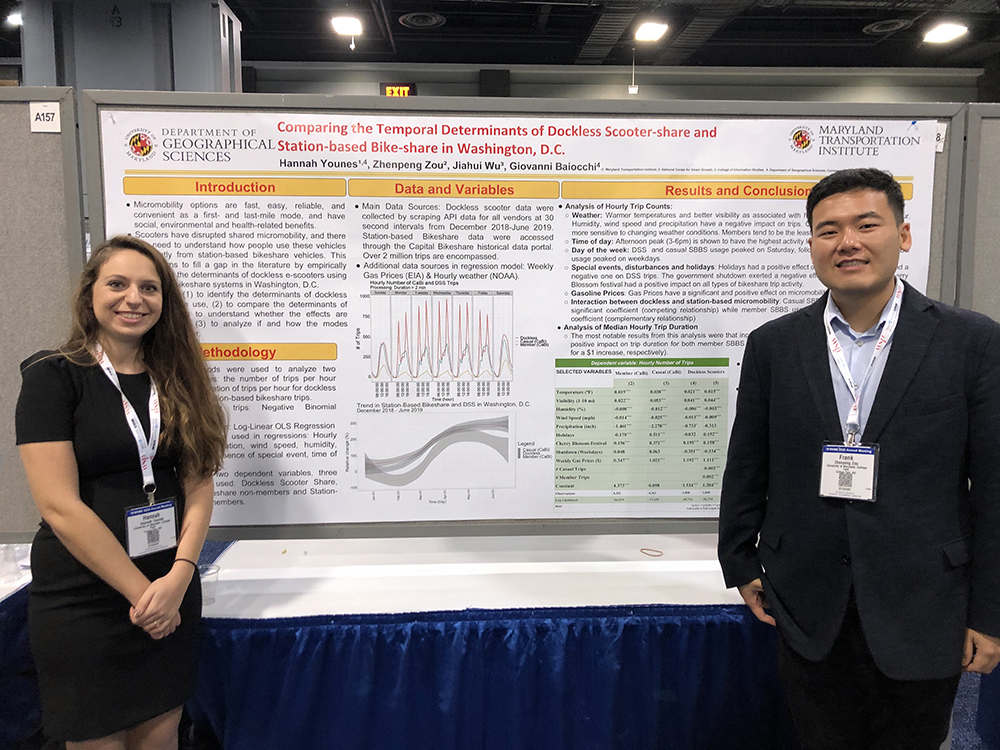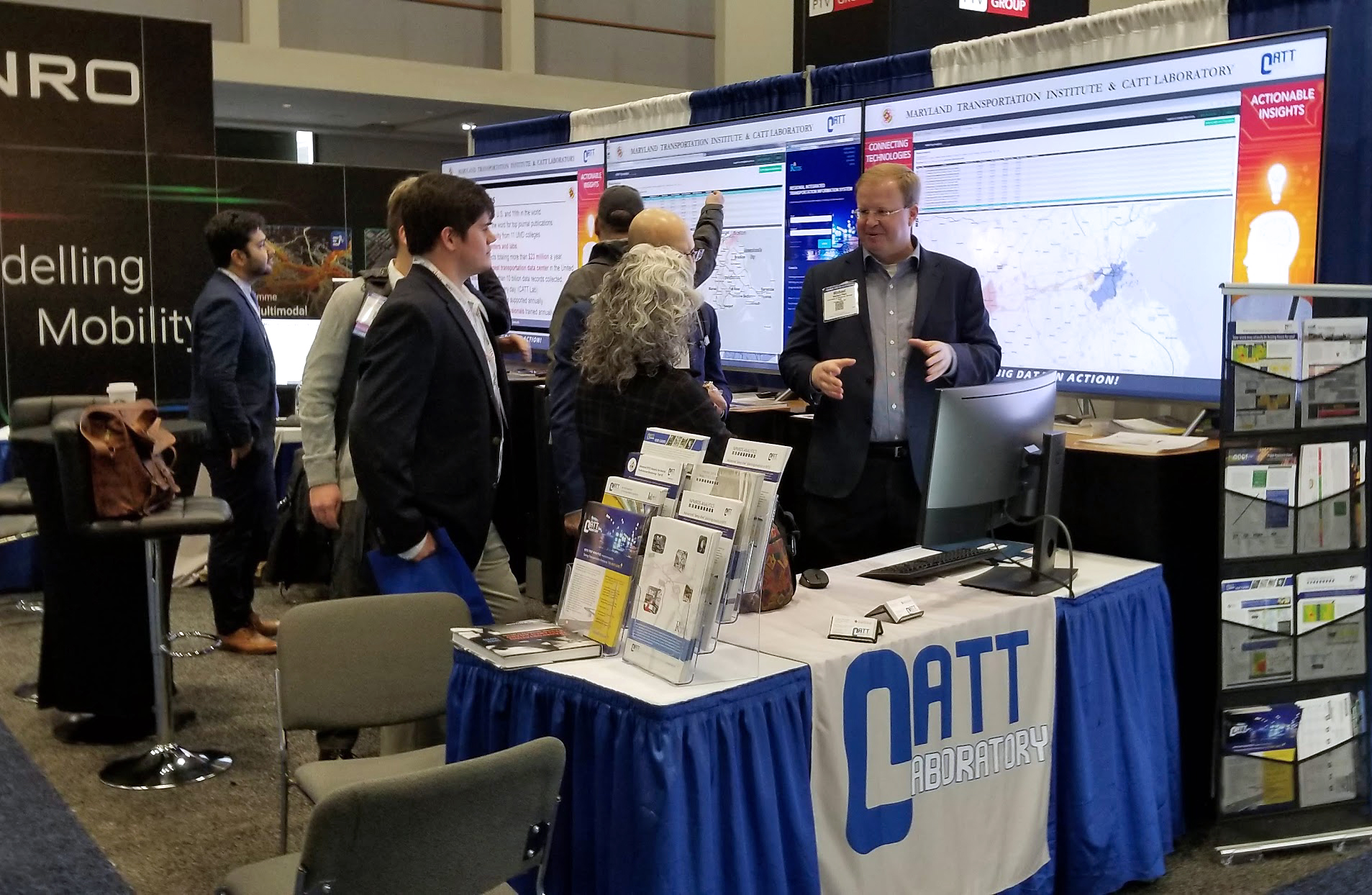 |
 Researchers from the University of Maryland’s Department of Civil and Environmental Engineering (CEE) and other departments tackled critical transportation-related challenges and presented innovative solutions at the Transportation Research Board (TRB)’s 99th Annual Meeting, held in Washington, DC from January 12-16. Researchers from the University of Maryland’s Department of Civil and Environmental Engineering (CEE) and other departments tackled critical transportation-related challenges and presented innovative solutions at the Transportation Research Board (TRB)’s 99th Annual Meeting, held in Washington, DC from January 12-16.
The UMD CEE department, part of the A. James Clark School of Engineering, is home to a highly ranked transportation engineering program and the Maryland Transportation Institute (MTI)—an interdisciplinary hub designed to foster collaborative research across the UMD system. Resources at MTI include the Center for Advanced Transportation Technology (CATT), which hosts the world’s largest archive of transportation Big Data (CATT Lab).
MTI and CATT Lab's booth at the event showcased a new addition to CATT Lab's Regional Integrated Transportation Information System (RITIS) Trip Analytics toolkit: a route analysis tool that provides at-a-glance information on the predominant routes between two locations, using data from mobile devices and 3rd-party connected vehicles to generate visualizations and other resources. The Route Analysis tool—a unique addition to the transportation analytics space—is now being offered to public agency users across the country, to enable planners and operators to assess the impact of, say, an emergency bridge closure, decide where to invest in technologies to smooth the flow of traffic, or even improve computer models to more accurately assess the impacts of vehicle emissions on air quality.
 Faculty presenting at TRB included Qingbin Cui, who unveiled a newly-completed database that will assist policymakers in determining the best methods for funding, implementing, and managing major public-private partnership (P3) highway projects. Drawing from multiple repositories, including the Federal Highway Administration’s Highway Performance monitoring system, the database covers P3 projects dating back to 2003 and provides at-a-glance tools for assessing outcomes. Faculty presenting at TRB included Qingbin Cui, who unveiled a newly-completed database that will assist policymakers in determining the best methods for funding, implementing, and managing major public-private partnership (P3) highway projects. Drawing from multiple repositories, including the Federal Highway Administration’s Highway Performance monitoring system, the database covers P3 projects dating back to 2003 and provides at-a-glance tools for assessing outcomes.
Cui, an expert on P3, also presented a paper detailing how bond indices can be used to evaluate the transportation P3 market in the United States.
Chenfeng Xiong, who holds joint appointments at the CEE department and the Shock Trauma and Anesthesiology Research (STAR) Center at the University of Maryland-Baltimore, presented a groundbreaking collaborative study that could lead to improvements in the triage process for vehicle crash victims, particularly among the elderly. Xiong and co-authors Zixi Wang (University of Southern California), Mofeng Yang (University of Maryland), Rosemary Kozar (University of Maryland, Baltimore) and MTI Director Lei Zhang (University of Maryland) studied the potential incorporation of real-time transportation data, including traffic volumes and time-dependent vehicle speeds, into the trauma triage decision-making process. Utilizing a Maryland dataset with records of more than 55,000 elderly patients, the authors constructed a machine learning model and then compared it to benchmark models that do not incorporate transportation data. The models trained with critical transportation information exhibited superior prediction accuracy.
 Several researchers presented work relating to new technologies and services that are transforming the way we get around. UMD doctoral student Hannah Younes and co-authors Zhenpeng Zou, Jiahui Wu and Giovanni Balocchi focused on an emerging transportation paradigm that is quickly growing in significance but has so far received relatively little attention among transportation researchers. Dockless or free-floating micromobility, including dockless scooter-share, was practically non-existent in 2017 but generated more than 38.5 million trips the following year, the authors noted. Their paper, “Comparing the Temporal Determinants of Dockless Scooter-Share (DSS) and Station-Based Bike-Share (SBBS) in Washington, D.C.,” used Application Program Interface (API) data from dockless vendors and historical trip data from Capitol Bikeshare in order to analyze user behavior, yielding conclusions about possible longer-term trends. Several researchers presented work relating to new technologies and services that are transforming the way we get around. UMD doctoral student Hannah Younes and co-authors Zhenpeng Zou, Jiahui Wu and Giovanni Balocchi focused on an emerging transportation paradigm that is quickly growing in significance but has so far received relatively little attention among transportation researchers. Dockless or free-floating micromobility, including dockless scooter-share, was practically non-existent in 2017 but generated more than 38.5 million trips the following year, the authors noted. Their paper, “Comparing the Temporal Determinants of Dockless Scooter-Share (DSS) and Station-Based Bike-Share (SBBS) in Washington, D.C.,” used Application Program Interface (API) data from dockless vendors and historical trip data from Capitol Bikeshare in order to analyze user behavior, yielding conclusions about possible longer-term trends.
 Experts from CATT showcased novel approaches incorporating big data, machine learning, and automation. Binya Zhang and co-authors Qinglian He and Sanaz Aliari conducted a statistical analysis of crash data in Virginia from 2010-17, examining factors such as time, location, collision type, surface conditions and light. The results could potentially assist officials and policymakers in identifying specific hazards—such as dangerous roads or intersections—and in long-term safety planning. Meanwhile, fellow researchers Sanaz Aliari, Zachary Vander Laan, Sepideh Eshragh, and Elham Sharifi presented a method for partially automating the process by which data from probe vendors is used to measure congestion. The new method offers potential improvements over the manual procedures now in use, which are not only time-consuming but affected by subjectivity and the skill of the analyst. Experts from CATT showcased novel approaches incorporating big data, machine learning, and automation. Binya Zhang and co-authors Qinglian He and Sanaz Aliari conducted a statistical analysis of crash data in Virginia from 2010-17, examining factors such as time, location, collision type, surface conditions and light. The results could potentially assist officials and policymakers in identifying specific hazards—such as dangerous roads or intersections—and in long-term safety planning. Meanwhile, fellow researchers Sanaz Aliari, Zachary Vander Laan, Sepideh Eshragh, and Elham Sharifi presented a method for partially automating the process by which data from probe vendors is used to measure congestion. The new method offers potential improvements over the manual procedures now in use, which are not only time-consuming but affected by subjectivity and the skill of the analyst.
Sara Zahedian, Przemys?aw Seku?a, Amir Nohekhan, and Vander Laan investigated the effect of incorporating Automatic Traffic Recorders (ATRs) into a machine learning regression model for estimating houriy traffic volumes, using the New Hampshire road network as a case study. In a separate presentation, Sekula. Vander Laan and Kaveh Farokhi Sadababi investigated the transferability of a machine learning-based model for estimating hourly traffic volume, looking at Florida and New Hampshire as case studies.
The lists below summarize UMD contributions to the TRB Annual Meeting.
Committees and Subcommittees
Joint Meeting of Regional Transportation Systems Management and Operations Data for Transportation Operations Subcommittee and Measuring and Quantifying Performance Subcommittee, Nikola Ivanov, University of Maryland, College Park, presiding
Regional Transportation Systems Management & Operations Committee, Subcommittee on Research Needs, Thomas Jacobs, chair
Quality Assurance Committee, Research Needs Statement for 2020, Dimitrios Goulias, University of Maryland, College Park, presiding as Committee Research Co-ordinator
Papers and Presentations
“Quantifying Probe Vendors’ Ability to Capture Congestion Events: Steps Towards Automating the Slowdown Validation Process,” Sanaz Aliari, Zachary Vander Laan, Sepideh Eshragh, Elham Sharifi
“Design of Multi-Path Traffic Progression for Congested Arterials with Connected Local Progression Bands,” Yen-Hsiang Chen, Yao Cheng, Gang-Len Chang
“Analytic Approximations of Realistic Tour Distances: Case Studies for Deliveries by Robots and Drones,” Youngmin Chou, Paul Schonfeld
“Evaluation of the Transportation P3 Market in the US: A Bond Index Approach,” Qingbin Cui
“Information Source for Major Transportation Projects,” Qingbin Cui
“Deep-Reinforcement, Learning-Based Ramp Metering Strategy with Image-Input Convolutional Neural Network,” Shenghong Dai (University of Wisconsin, Madison), Changyan Fan (Southeast University), Mofeng Yang (University of Maryland), Zhibin Li (Southeast University), Yuxuan Hou (Southeast University)
“Exploiting Passively-Collected Mobile Device Location Data to Study Disaster Evacuation Behavior: A Case Study of Hurricane Irma,” Ariel Darzi, Hannah Younes, Sepehr Ghader, Lei Zhang
“Advanced Data Analytics and Mesoscopic Dynamic Traffic Assignment Simulation for Traffic Impact Analysis of Maryland Casinos,” David Donaldson, Laura Garrido, Zheng Zhu, Lei Zhang
“An Integer Programming Model for Dynamic Taxi Sharing Considering Provider Profit,” Yeming Hao, Ali Haghani
“Equity Analysis of Payments Made on the I-405 Express Toll Lanes in Washington State,” Mark Hallenbeck (University of Washington), Kiana Roshan Zamir (University of Maryland)
“Usage Patterns of the I-405 Express Toll Lanes in Washington State and Price,” Mark Hallenbeck, (University of Washington), Kiana Roshan Zamir (University of Maryland)
“Exploring the Effect of Battery Capacity on Electric Vehicle Sharing Programs using a Simulation Approach,” Songhua Hu (University of Maryland), Peng Chen (Tongji University), Chi Xie (Tongji University), Xiaohong Chen (Tongji University)
“Who Drives an Electric Vehicle?: Influential Factors Related to the Adoption of PHEVs and BEVs in California,” Hiroyuki Iseki
“Investment in Innovative Technology Versus Traditional Infrastructure Improvements: A Preliminary Analysis of CAV Implementation for Network Bottleneck Removal in Maryland,” Eirini Kastrouni, Carlos Carrion (JD.com), Lei Zhang
“Design of Multimodal Signal Progression Along an Arterial with Bus Dedicated Lanes,” Hyeonmi Kim (The Korea Transport Institute), Yao Cheng (University of Maryland), Gang-Len Chang (University of Maryland)
“Optimization of Service Zones and Frequencies for Freight Deliveries,” Chelsie Raleigh (CME Associates, Inc.), Myungseon Kim (Western New England University), Paul Schonfeld (University of Maryland)
“Reliable Schedule Coordination for a Bus Transit Corridor: A Shanghai Case,” Xiongfei Lai (Tongji University), Jing Teng (Tongji University), Paul Schonfeld (Univerity of Maryland), Lu Ling (Purdue University)
“Trajectory Planning for Connected and Automated Vehicles: Cruising and Platooning in Mixed Traffic,” Xiangguo Liu (Northwestern University), Guangchen Zhao (University of Maryland, Neda Masoud (University of Michigan, Ann Arbor), Qi Zhu (Northwestern University)
“Retrieving Activity Locations from Mobile Device Location Data Based on a Hierarchical Density-Based Clustering Method,” Yixuan Pan, Lei Zhang
“Non-Destructive Testing Methods in Quality Assurance and Quality Control of Concrete for Monitoring Strength Gain During Production,” Setare Ghahri Saremi, Dimitrios Goulias, Anjuman Ara Akhter
“Transferability of a machine learning-based model of hourly traffic volume estimation—Florida and New Hampshire case study,” Przemys?aw Seku?a, Zachary Vander Laan, Kaveh Farokhi Sadabadi, Krzysztof Kania (Uniwersytet Ekonomiczny w Katowicach)
“Application of GIS Analysis to Obtain Anisotropic Bicycle Catchment Areas with Level of Traffic Stress and Energy Consumption,” Rachel Tillinghast, Devin McNally, Hiroyuki Iseki
“Integrating Transportation Data with Emergency Medical Service Records to Improve Triage Decision of High-Risk Trauma Patients,” Chenfeng Xiong (University of Maryland), Zixi Wang (University of Southern California), Mofeng Yang (University of Maryland), Rosemary Kozar (University of Maryland, Baltimore), Lei Zhang (University of Maryland)
“Comparing the Temporal Determinants of Dockless Scooter-Share and Station-Based Bike-share in Washington, D.C.,” Hannah Younes, Zhenpeng Zou, Jiahui Wu, Giovanni Balocchi
“Estimating Hourly Traffic Volumes Using Artificial Neural Network with Additional Inputs of Automatic Traffic Recorders,” Sara Zahedian, Przemys?aw Seku?a, Amir Nohekhan, Zachary Vander Laan
“Analysis of the Effects of Urban Form on Dockless Bikeshare and Scootershare Systems Usage: The Case of Washington, D.C.,” Kiana Roshan Zamir (University of Maryland), Arefeh Nasri (University of Maryland), Stefanie Brodie (Toole Design Group, LLC)
“Virginia Crash Data Analysis,” Binya Zhang, Qinglian He, Sanaz Aliari
“Analyzing Travel Behavior Responses Under Personalized Incentives with Interpretable Machine Learning Methods,” Jun Zhao, Chenfeng Xiong, Ya Ji, Lei Zhang
“Learning to Identify Critical Link Combinations of Roadway System Through Network Embedding,” Tingting Zhao (University of Maryland), Di Zhuang (University of South Florida), Yu Zhang (University of South Florida)
“Life-Cycle Analysis for Sustainable Rehabilitation Strategies in Pavement Management Systems,” Yunpeng Zhao, Dimitrios Goulias
“A Q Learning-Based Coordination of Variable Speed Limit and Hard Shoulder Running to Reduce Corridor Travel Time at Freeway Bottlenecks,” Weiyi Zhou, Mofeng Zhang, Minha Lee, Lei Zhang
Recognition
Urban Mobility & Equity Center University Transportation Center Outstanding Student of the Year: Hannah Younes
Related Articles:
MTI Partners with State Highway Administration to Understand Trucker Parking Decisions
UMD, Morgan State Partner to Improve County Evacuation Plans
The App that Fights Congestion, Emissions
MTI App that Rewards Smart Commuting Featured in Washington Post, City Lab
MTI and Battelle to Build Database for Public-Private Partnerships
State, university officials celebrate launch of newly formed, cross-discipline transportation institute
January 30, 2020
|

